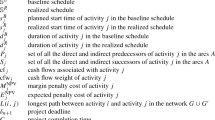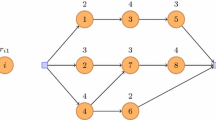Abstract
This paper addresses the resource-constrained project problem in which activity durations are stochastic variables and the objective is to maximize the net present value of cash flow in the project. First, using the two classical time buffering methods, proactive scheduling optimization models are constructed to generate the robust schedules. Then, two reactive scheduling models with different objectives are proposed to adjust the baseline schedules when disruptions occur during their execution. For the NP-hardness of the studied problem, three heuristic algorithms, including tabu search (TS), variable neighbourhood search (VNS), and a mixed version of VNS and TS, are developed and compared with the multi-start iteration improvement algorithm through a computational experiment conducted on a randomly generated data set. In addition, based on the computational results obtained, the effects of several key parameters on the proactive and reactive scheduling results are analysed, and some managerial insights are obtained. The research in this paper has practical implications for contractors to improve the project profit in an uncertain environment.



Similar content being viewed by others
References
Al-Fawzan MA and Haouari M (2005). A bi-objective model for robust resource-constrained project scheduling. International Journal of Production Economics 96(2):175–187.
Artigues C, Michelon P and Reusser S (2003). Insertion techniques for static and dynamic resource-constrained project scheduling. European Journal of Operational Research 149(2):249–267.
Brucker P, Drexl A, Möhring R, Neumann K and Pesch E (1999). Resource-constrained project scheduling: Notation, classification, models, and methods. European Journal of Operational Research 112(1):3–41.
Bruni ME, Beraldi P, Guerriero F and Pinto E (2011). A heuristic approach for resource constrained project scheduling with uncertain activity durations. Computers & Operations Research 38(9):1305–1318.
Creemers S, Leus R and Lambrecht M (2010). Scheduling Markovian PERT networks to maximize the net present value. Operations Research Letters 38(1):51–56.
Deblaere F, Demeulemeester E and Herroelen W (2011a). Proactive policies for the stochastic resource-constrained project scheduling problem. European Journal of Operational Research 214(2):308–316.
Deblaere F, Demeulemeester E and Herroelen W (2011b). Reactive scheduling in the multi-mode RCPSP. Computers & Operations Research 38(1):63–74.
Elmaghraby SE (2005). On the fallacy of averages in project risk management. European Journal of Operational Research 165(2):307–313.
Garaix T, Artigues C and Briand C (2013). Fast minimum float computation in activity networks under interval uncertainty. Journal of Scheduling 16(1):93–103.
Glover F (1986). Future path for integer programming and links to artificial intelligence. Computers and Operations Research 13(5):533–549.
Hansen P, Mladenović N and Pérez J A M (2010). Variable neighbourhood search: methods and applications. Annals of Operations Research 175(1):367–407.
Hartmann S and Briskorn D (2010). A survey of variants and extensions of the resource-constrained project scheduling problem. European Journal of Operational Research 207(1):1–14.
Hazır Ö, Haouari M and Erel E (2010). Robust scheduling and robustness measures for the discrete time/cost trade-off problem. European Journal of Operational Research 207(2):633–643.
He Z, Liu R and Jia T (2012). Metaheuristics for multi-mode capital-constrained project payment scheduling. European Journal of Operational Research 223(3):605–613.
He Z, Wang N and Li P (2014). Simulated annealing for financing cost distribution based project payment scheduling from a joint perspective. Annals of Operations Research 213(1):203–220.
Herroelen W and Leus R (2004a). The construction of stable project baseline schedules. European Journal of Operational Research 156(3):550–565.
Herroelen W and Leus R (2004b). Robust and reactive project scheduling: A review and classification of procedures. International Journal of Production Research 42(8):1599–1620.
Herroelen W and Leus R (2005). Project scheduling under uncertainty: Survey and research potentials. European Journal of Operational Research 165(2):289–306.
Hu X, Cui N and Demeulemeester E (2015). Effective expediting to improve project due date and cost performance through buffer management. International Journal of Production Research 53(5):1460–1471.
Kavlak N, Ulusoy G, Şerifoğlu FS and Birbil Şİ (2009). Client-contractor bargaining on net present value in project scheduling with limited resources. Naval Research Logistics 56(2):93–112.
Kazaz B and Sepil C (1996). Project scheduling with discounted cash flows and progress payments. Journal of the Operational Research Society 47(10):1262–1272.
Khemakhem MA and Chtourou H (2013). Efficient robustness measures for the resource-constrained project scheduling problem. International Journal of Industrial and Systems Engineering 14(2):245–267.
Khoshjahan Y, Najafi AA and Afshar-Nadjafi B (2013). Resource constrained project scheduling problem with discounted earliness–tardiness penalties: Mathematical modeling and solving procedure. Computers & Industrial Engineering 66(2):293–300.
Kolisch R and Padman R (2001). An integrated survey of deterministic project scheduling. Omega 29(3):249–272.
Kolisch R and Sprecher A (1996). PSPLIB—A project scheduling problem library. European Journal of Operational Research 96(1):205–216.
Lamas P and Demeulemeester E (2016). A purely proactive scheduling procedure for the resource-constrained project scheduling problem with stochastic activity durations. Journal of Scheduling 19(4):409–428.
Lambrechts O, Demeulemeester E and Herroelen W (2008a). A tabu search procedure for developing robust predictive project schedules. International Journal of Production Economics 111(2):493–508.
Lambrechts O, Demeulemeester E and Herroelen W (2008b). Proactive and reactive strategies for resource-constrained project scheduling with uncertain resource availabilities. Journal of Scheduling 11(2):121–136.
Lambrechts O, Demeulemeester E and Herroelen W (2011). Time slack-based techniques for robust project scheduling subject to resource uncertainty. Annals of Operations Research 186(1):443–464.
Leus R (2003). The Generation of Stable Project Plans. Complexity and Exact Algorithms. KU Leuven, Faculteit Economische en Toegepaste Economische Wetenschappen: Leuven.
Leyman P and Vanhoucke M (2016). Payment models and net present value optimization for resource-constrained project scheduling. Computers & Industrial Engineering 91:139–153.
Mika M, Waligóra G and Węglarz J (2008). Tabu search for multi-mode resource-constrained project scheduling with schedule-dependent setup times. European Journal of Operational Research 187(3):1238–1250.
Mladenović N and Hansen P (1997). Variable neighbourhood search. Computers and Operations Research 24(11):1097–1100.
Said SS and Haouari M (2015). A hybrid simulation-optimization approach for the robust discrete time/cost trade-off problem. Applied Mathematics and Computation 259:628–636.
Schwindt C and Zimmermann J (2015). Handbook of Project Management and Scheduling. Springer International Publishing AG: Berlin, Germany.
Sobel MJ, Szmerekovsky JG and Tilson V (2009). Scheduling projects with stochastic activity duration to maximize expected net present value. European Journal of Operational Research 198(3):697–705.
Van de Vonder S, Ballestín F, Demeulemeester E and Herroelen W (2007). Heuristic procedures for reactive project scheduling. Computers & Industrial Engineering 52(1):11–28.
Van de Vonder S, Demeulemeester E and Herroelen W (2008). Proactive heuristic procedures for robust project scheduling: An experimental analysis. European Journal of Operational Research 189(3):723–733.
Van de Vonder S, Demeulemeester E, Herroelen W and Leus R (2005). The use of buffers in project management: The trade-off between stability and makespan. International Journal of Production Economics 97(2):227–240.
Van de Vonder S, Demeulemeester E, Herroelen W and Leus R. (2006). The trade-off between stability and makespan in resource-constrained project scheduling. International Journal of Production Research 44(2):215–236.
Vanhoucke M, Demeulemeester E and Herroelen W (2001). On maximizing the net present value of a project under renewable resource constraints. Management Science 47(8):1113–1121.
Waligóra G (2008). Discrete–continuous project scheduling with discounted cash flows—A tabu search approach. Computers & Operations Research 35(7):2141–2153.
Waligóra G (2014). Simulated annealing and tabu search for discrete-continuous project scheduling with discounted cash flows. RAIRO-Operations Research 48(1):1–24.
Węglarz J, Józefowska J, Mika M and Waligóra G (2011). Project scheduling with finite or infinite number of activity processing modes—a survey. European Journal of Operational Research 208(3):177–205.
Wiesemann W, Kuhn D and Rustem B (2010). Maximizing the net present value of a project under uncertainty. European Journal of Operational Research 202(2):356–367.
Zhang J and Elmaghraby SE (2014). The relevance of the “alphorn of uncertainty” to the financial management of projects under uncertainty. European Journal of Operational Research 238(1):65–76.
Zhu G, Bard J F and Yu G (2005). Disruption management for resource-constrained project scheduling. Journal of the Operational Research Society 56(4):365–381.
Acknowledgments
We express our gratitude to the two anonymous referees for their valuable comments, which improved this paper considerably. The research was supported by the National Natural Science Foundation of China under Grants No. 71371150, 71572138, 71390331, 71271168, and 71572148, and the Program for New Century Excellent Talents in University under Grant No. NCET-13-0460.
Author information
Authors and Affiliations
Corresponding author
Rights and permissions
About this article
Cite this article
Zheng, W., He, Z., Wang, N. et al. Proactive and reactive resource-constrained max-NPV project scheduling with random activity duration. J Oper Res Soc (2017). https://doi.org/10.1057/s41274-017-0198-3
Received:
Accepted:
Published:
DOI: https://doi.org/10.1057/s41274-017-0198-3




